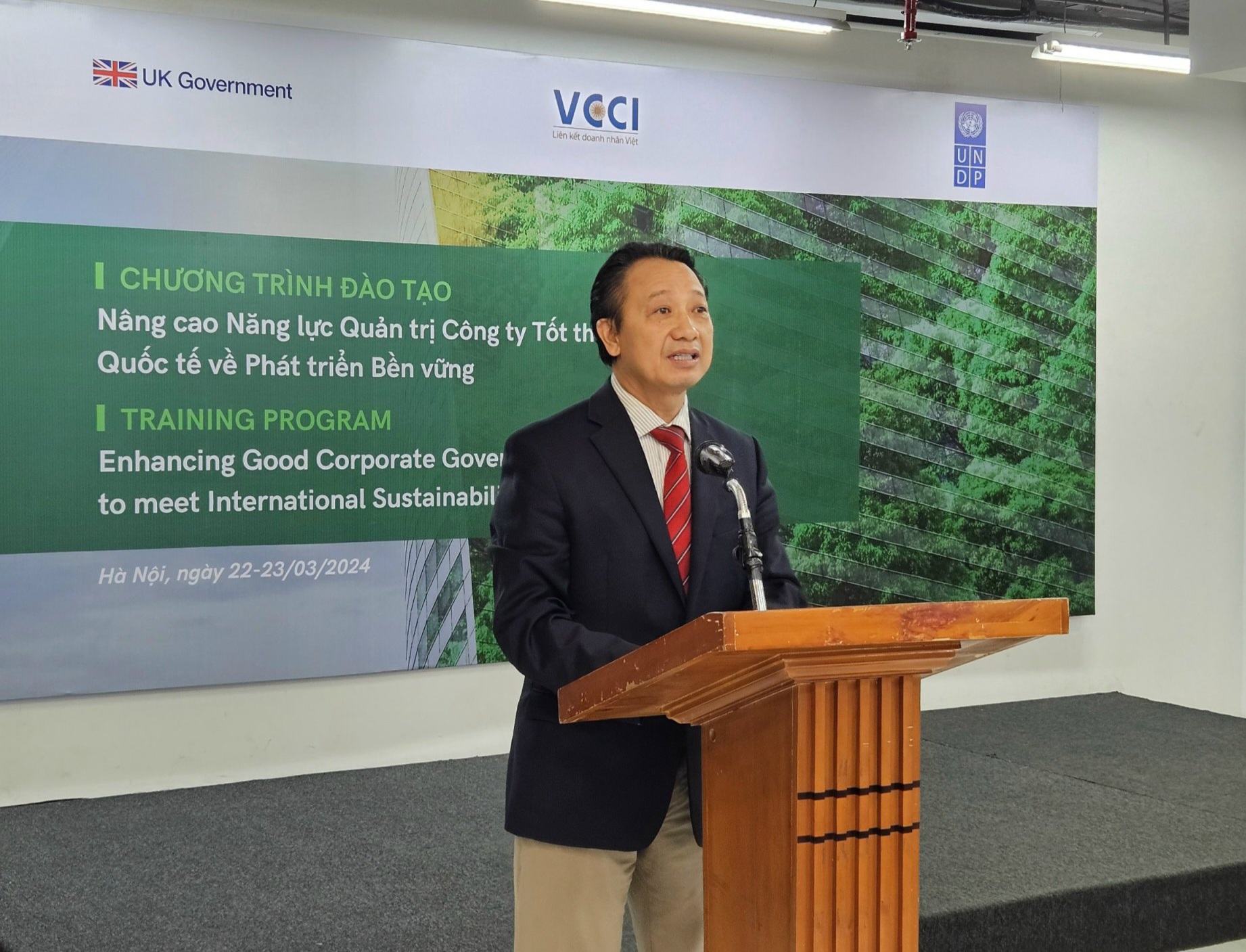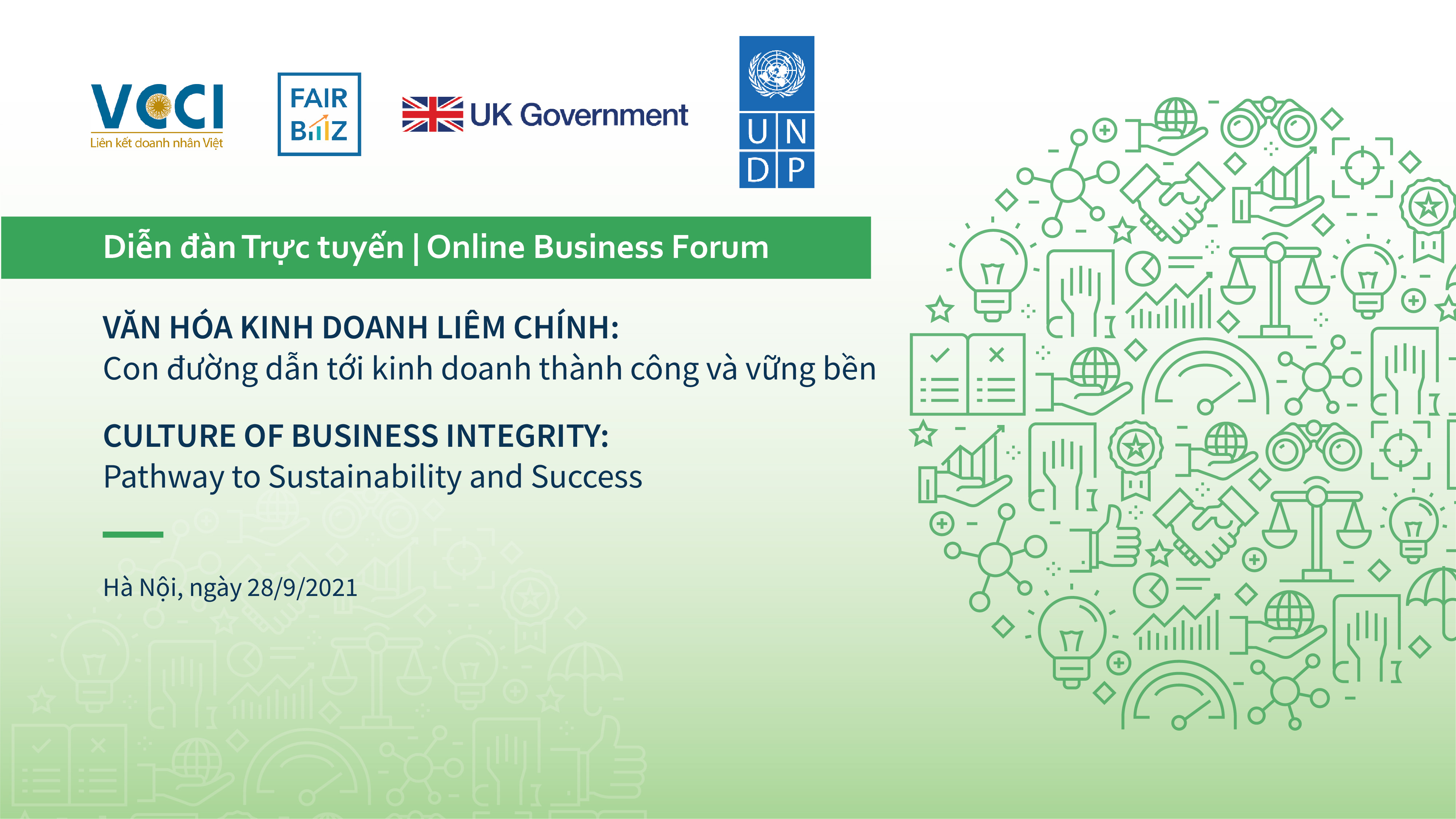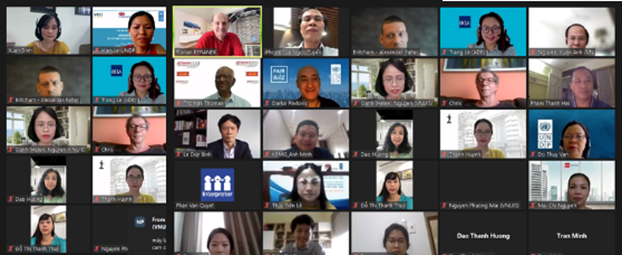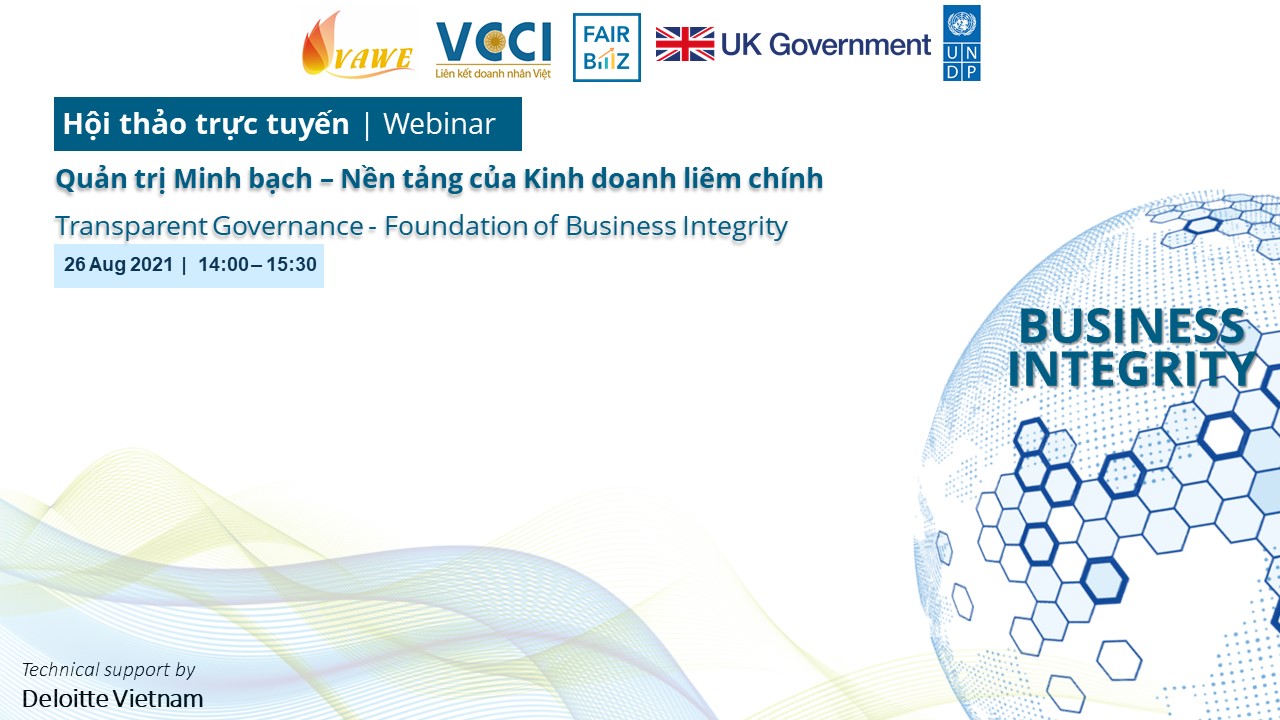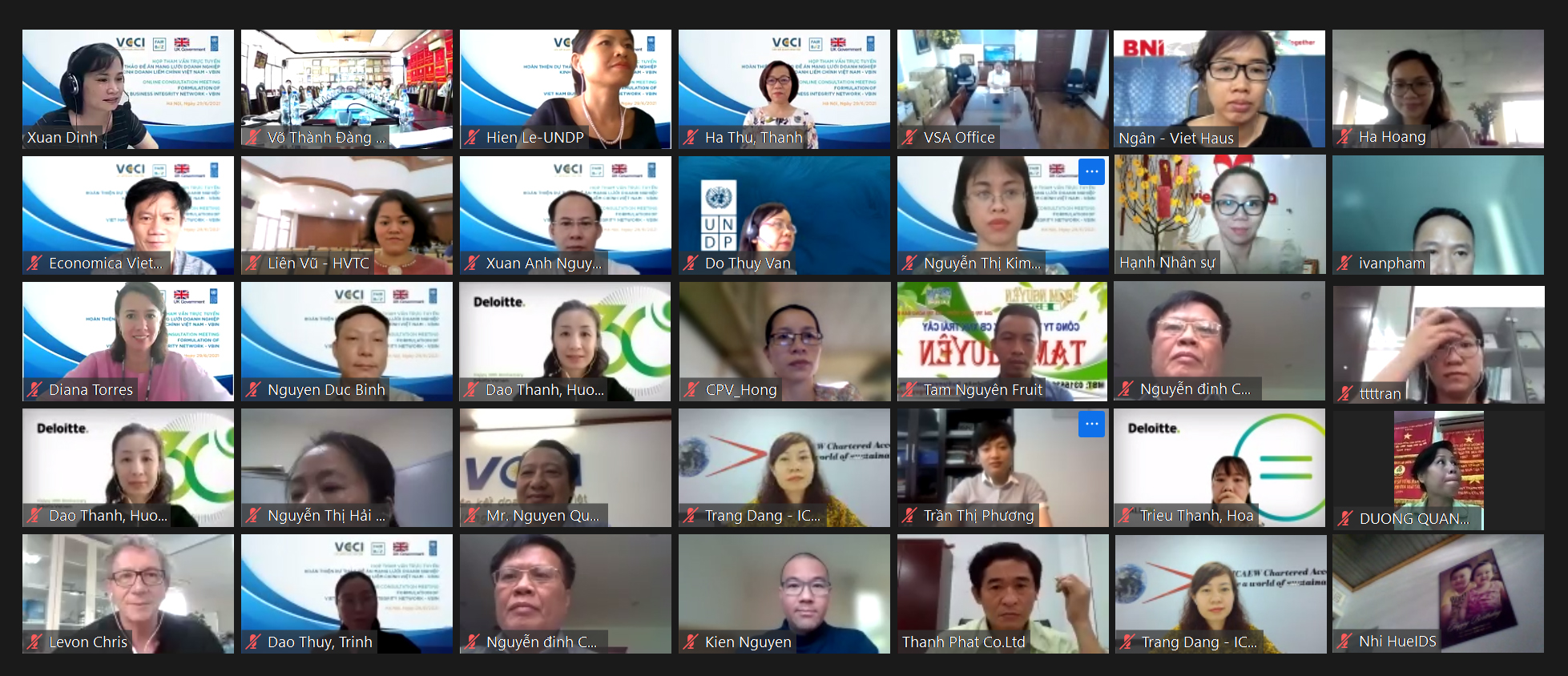The “Governance – Business Initiative – GBII” implemented by the Office for Business Sustainable Development (SDforB) of VCCI funded by the UK Government, ASEAN Economic Reform Program through UNDP’s Regional Project on “Promoting a Fair Business Environment in ASEAN”. We are looking for a local consulting company and/or a national consultant team who have appropriate qualification and experience to develop the Vietnam Business Integrity Index. Please view ToR here for detail. Method of bidder selection: Shorten national shopping by a technical proposal Deadline for submission of technical: before 17 pm, 20th October 2021 Submission form: send email to xuandtb@vcci.com.vn Contact person: Ms Xuân, Tel: 024 35743492
New post
Below, please kindly find the entire opening speech by Mr. Nguyen Tien Huy, Director General, Office for Business Sustainable Development – VCCI at the workshop titled “Joining hands to promote a fair business environment in Vietnam”, which devlivered on 22 December 2022 in Hanoi. Ms. Ruth Turner, Political and Development Counselor, British Embassy in Vietnam, Mr. Tomas Kvedaras, Project Specialist, Judicial Integrity Network in ASEAN, FairBiz project, UNDP’s Regional Hub in Bangkok, Thailand, Do Thuy Van, Program Manager, UNDP Vietnam, Ladies and Gentlemen, distinguished delegates, businesses, press agencies…, We are now at the last days of 2022. For businesses, this probably is the busiest time to “speed up and reach the finish line” towards achieving business production plans. Therefore, the large participation of business representatives at the workshop today demonstrates the great interest of the business community in integrity and fair business environment which is always considered as a burning topic. On behalf of Vietnam Chamber of Commerce and Industry (VCCI), I would like to express my sincere thanks today in particular to the representative of the British Embassy, the representative of UNDP’s regional FairBiz project and many businesses and media agencies for attending our workshop titled “Joining hands to promote a fair business environment in Vietnam” and also for actively joining efforts, providing support and coordinating with VCCI on the journey into forming a business integrity community during over time. Ladies and Gentlemen, “Corruption remains one of the biggest obstacles to global socio-economic development. Corruption affects the implementation of the 2030 Agenda for Sustainable Development; causes negative impacts on markets and generates unequal consequences for the most vulnerable among us. Collective action plays an important role to help implement business integrity and build a more transparent global economy.” As Mrs. Sanda Ojiambo, Executive Director of the UN Global Compact Network underlined in her statement. Sharing the same perception that corruption arises as an issue with global impacts so that a global approach to anti-corruption is required along with a vision for promoting sustainable development of the business community in Vietnam, VCCI understands that only through creating a transparent, fair, integrity business environment, we will be able to mobilize and optimize use of resources of the private sector, avoid losses and waste. From there, businesses can increase their trust and concentrate resources on business production, long-term investment which contribute to the goal of sustainable socio-economic development of the locality and the nation, also improve competitiveness and strengthen international integration. Regarding the National Anti-corruption Strategy until 2020 and the United Nations Convention against Corruption Implementation Plan, as a national organization representing and bringing together the business community and entrepreneurs in Vietnam, VCCI has taken drastic measures to promote the role of businesses, business associations and trade associations in anti-corruption through developing and building a healthy, uncorrupted business culture; creating a transparent and fair competitive business environment; raising awareness on legal compliance of businesses; eradicating step by step bribery in the relationship between businesses and state agencies; coordinating with competent agencies to prevent and promptly detect acts of harassment and bribery of officials and public servants… VCCI has built a cooperative and cohesive relationship with agencies, international organizations by implementing activities to promote anti-corruption practices in business. VCCI has been actively participating in initiatives to learn from experiences, recognize and highlight domestic efforts for the promotion of business integrity. VCCI is a member of the Executive Board of the ASEAN CSR Network, a member of the Integrity Working Group in ASEAN; is an effective partner with international organizations such as OECD, UNDP, and member of the Global Compact Network – UNGC, World Business Council for Sustainable Development – WBCSD… Ladies and Gentlemen, Since 2017, VCCI has been working closely with UNDP under the support from United Kingdom for implementing the FairBiz Project and the Government Business Integrity Initiative (GBII). Mentioning some notable results that we have achieved over the past time such as: nearly 1500 businesses have received training in internal control mechanism and code of conduct; engaging 15 business associations with nearly 13,000 members to sign a business integrity pledge; providing technical support for 05 businesses included Traphaco, Vietnam Maritime Corporation (VIMC), Fine Scandinavia, and 02 female-owned enterprises; initiating the Vietnam Business Integrity Network (VBIN) in 2021. The establishment of VBIN demonstrates great efforts of VCCI, UNDP, and British Embassy in Vietnam in raising awareness of the business community in Vietnam about business integrity, encouraging business leaders to act on business principles and practices, as well as enhancing multi-stakeholder engagement, policy dialogue which facilitates responsible business conduct, and creates a more transparent and equal business environment in Vietnam. VBIN has achieved a number of very important and encouraging initial results such as: the launching of Vietnam Business Integrity Index, assessing the current state of business integrity implementation among 30 listed companies in HCM and HN, building an online tool platform to evaluate the level of business integrity implementation. All these contents will also be shared in detail with delegates at the workshop’s program today. Ladies and Gentlemen, The outcomes of the Provincial Competitiveness Index (PCI) survey conducted by VCCI have shown that anti-corruption practices in recent years have known positive deliverables. Specifically, the rate of businesses having to pay informal fees in general in the PCI 2021 survey decreased to 41.4% compared to 44.9% in 2020. This is also the lowest level in the past 16 years (in 2006 it was 70%). The size of informal expenses also has decreased significantly over time when the proportion of enterprises spending more than 10% of revenue to pay for this type of expense is only about 4.1%, decreased twice as in 2016 (9.1%). However, there’s still a lot of space for improvement. For example, the percentage of businesses having said “The incident of troubling for handling business procedures is common” was 57.4% in 2021, higher than 54.1% in 2019-2020. That being said, in order to create a more transparent and fair business environment, in addition to the leadership of the Government and all bodies of government, the business community must proactively take collective initiatives which have a decisive meaning. Collective action saves time and resources generate significant inspirational influence, and helps accelerate systemic changes towards business integrity and transparency. To go fast, we go alone. But to go far, we must go together. That is also the spirit of SDG Goal 17: Partnership – Strengthening Cooperation. Together, we go further. Together, we go stronger. Let’s join hands and act together towards a fair business environment for all businesses in Vietnam, for the future and sustainable development of businesses themselves. And with that conviction, I would like to respectfully announce that today’s workshop is now open. Wish you all a successful meeting! Finally, I wish you and your family a Christmas season and a New Year 2023 filled with kindness, love and joy! Merry Christmas and Happy New Year!
Project news, Relevant news
The “Governance – Business Initiative – GBII” implemented by the Office for Business Sustainable Development (SDforB) of VCCI funded by the UK Government, ASEAN Economic Reform Program through UNDP’s Regional Project on “Promoting a Fair Business Environment in ASEAN”. We are looking for a local consulting company and/or a national consultant team who have appropriate qualification and experience to deliver these trainings. Please view ToR here for detail. Method of bidder selection: Shorten national shopping by a technical proposal Deadline for submission of technical: before 17 pm, 20th October 2021 Submission form: send email to xuandtb@vcci.com.vn Contact person: Ms Xuân, Tel: 024 35743492
Project news, Relevant news
Ha Noi, 28 September 2021 – Fifteen business associations have signed the Viet Nam Business Integrity Pledge to express commitment on corporate compliance and business integrity and transparency. This was told at an online Business Forum in Ha Noi today by the Viet Nam Chamber of Commerce and Industry (VCCI), the UN Development Programme (UNDP), and the British Embassy in Ha Noi. The Forum – “Culture of Business Integrity: Pathway to Sustainability and Success” – brought together nearly 130 representatives from businesses, government agencies, international organizations, experts, academia and press agencies. Women play an increasingly important role in business, with female-owned enterprises occupying nearly 30% of the total enterprises and 32% managers of enterprises being women. The 15th member of the Business Integrity Pledge is the Viet Nam Association for Women Entrepreneurs. “I believe an effective business environment, rooted in transparent corporate governance, is a crucial factor to foster bilateral investments and long-term trade partnership between the UK and Viet Nam. The UK sets a high value in merging the ethics and integrity principles into corporate governance since it has long been more than a matter of business’s branding. It forms a wider and more sustainable value not only in financial return but also in minimising negative impacts on the society.” Mr. Marcus Winsley, Deputy Head of Mission, British Embassy in Viet Nam said in his opening speech. On this occasion, the Advisory Group of Viet Nam Business Integrity Network – VBIN – made it first apperance. The VBIN is the first collective action initiative led by business to promote a culture of business integrity and anti-corruption compliance. The mission of the VBIN is to mobilize collective efforts of the business community to comply with rules and regulations related to business integrity and to adopt good business integrity practices, thereby improve corporate governance, ensuring competitiveness and sustainability of Vietnamese businesses. Fifteen Government agencies and businesses, and 5 experts have joined the VBIN Advisory Group. “Though significant improvements recorded, nearly half of businesses surveyed in the Viet Nam Provincial Competitiveness Index 2020 reported paying informal charges,” UNDP Deputy Resident Representative in Viet Nam Patrick Haverman noted. “Further progress in embedding transparency, integrity, accountability, and anti-corruption into Vietnamese companies’ operations will be critical in the socio-economic covid recovery”. Mr. Haverman highlighted important aspects for successful economic rebound, namely Business integrity being a key enabler in doing business in Viet Nam; Companies committed to integrity, transparency, and investing in responsible and sustainable practices being more resilient to crises such as the Covid-19 pandemic and poised to long-term success; and Collective action required to help build a busines integrity culture. The achievements and good practices shared at the Forum are the results of three years’ partnership between VCCI, UNDP and the UK Government under the UNDP’s Regional Project “Promoting A Fair Business Environment in ASEAN” – Fair Biz – funded by the UK Government under ASEAN Economic Reform Programme. More than 800 firms and business associations have improved their knowledge and skills to apply internal control and codes of conduct in their businesses. Four companies have received in-house technical assistance for devleloping and strenthening code of conduct or internal controls. “COVID-19 is a test for business integrity.,” Mr. Nguyen Quang Vinh, VCCI Secretary General, emphasized. “There is something companies can do to protect themselves by putting an integrity agenda at the heart of their response to the challenges. Businesses are also recommended to actively join a business led initiative like Vietnam Business Integrity Network which will allow companies to help each other and collectively work together to enhance good corporate governance towards long term sustainibility” . The Forum is one of the key activities of the Government and Business Integrity Initiative (GBII) implemented by VCCI and UNDP in Viet Nam under Fair Biz. This project aims to support enhancing business integrity and transparency, strengthening laws and policy in anti-corruption, and effective dispute resolution mechanism in Viet Nam.
Project news
Based on the success of the online Consultation Meeting to formulate Vietnam Business Integrity Network (VBIN), a business-led initiative supported by the UK Prosperity Fund, the Vietnam Chamber of Commerce and Industry (VCCI) in collaboration with UNDP Vietnam co-organized the first online VBIN advisory group meeting on past 10th September. This meeting aimed to introduce VBIN Advisory Group key members, gather helpful inputs for upcoming six-month work plan of VBIN and identify possibility and readiness of participation of members to VBIN establishment. At the meeting, Mr. Phi Ngoc Tuyen, Deputy Director General of Anti-corruption Bureau made his speech and strongly supported to VBIN’s goals. He also emphasized that the VBIN network is very necessary and important for businesses during the process of integrating the global supply chain. From the Government Inspectorate side, he expressed real commitment to fully act on consulting the state policies and laws which contribute to promote a fair business environment in Vietnam. Along with that, Mr. Thomas, Executive Director of ASEAN CSR Network highly appreciated the VBIN initiative and pointed out integrity is a core solution to help boost business resilience in times of crisis such as the Covid-19 pandemic, especially improve the ability to meet the requirements of the market towards long-term sustainability. Despite the size of company, whether ethics and integrity are incorporated into business strategy, it would help to build good reputation and attract more genuine investors. In addition, Mr. Le Duy Binh, Director of ECONOMICA, project constultant of the VBIN concept mentioned about building up a database of Vietnamese businesses in which their integrity is rated by using well-defined criterion. The implementation should be developed step by step. At initial stage, the focus will be laid on listed companies to be then expanded to cover public joint-stock companies and SOEs. Through many international experiences in developing company rating, the Association of Chartered Certified Accountants (ACCA) showed the effective method to engage the business community in this ranking related to adopt good business practices. Therefore, the VBIN network is expected to closely connect among businesses and mobilize collective efforts of the business community to enhance business integrity and comply with regulations. The meeting brought together nearly 30 members committed in joining the VBIN Advisory Group from SMEs, Big4 companies, law firms, state agencies, NGOs and high-qualified project experts and lecturers. On this great occasion, the VBIN Advisory Group members also shared their expectation to open new cooperation opportunities and coordinate different resources. All proposed recommendations create a foundation to design the next activities to enlarge VBIN such as training &consulting, BI index, communication and engagement; identify key products and services that VBIN can offer businesses…
Project news, Relevant news
On past 8th July, 2021, Vietnam Association for Women Entrepreneurs (VAWE) became the 15th member which have signed the Business Integrity Pledge and expressed strong support to the objectives of Vietnam Business Integrity Network -VBIN. This is an initiative implemented by VCCI and a key component under the UNDP’s Regional Project “Promoting A Fair Business Environment in ASEAN” funded by the UK Government under ASEAN Economic Reform Programme. Representatives of UNDP, VCCI, VAWE and spearkers were at the virtual workshop In order to make an official appearance as the 15th member of this network, VAWE coordinated with VCCI, UNDP and British Embassy to co-organize the online workshop titled “Transparent Governance- Foundation of Business Integrity” on 26th August, 2021. At the workshop, female entrepreneurs have shared the basic principles of transparent governance through corporate governance and financial management. Thereby, women entrepreneurs need to carefully consider what they are building towards good corporate governance and sustainable management system. In addition to the participation of the organizer board, the workshop have brought together more than 160 delegates being as VAWE Executive Committee members, women entrepreneurs, heads of management, finance and human resources departments from VAWE memberships and the 28 Provincial Women’s Business Associations. Even during the affected condition of the Covid-19 pandemic, a large number of women entrepreneurs still attended the workshop from across the country. This positive sign proved that female-owned enterprises have paid great attention to navigate their businesses in accordance to the standards of business with proactive implementation of business integrity towards long-term sustainable development in the future.
Project news
Building upon the success of several recent projects and programs in business integrity, the Vietnam Chamber of Commerce and Industry (VCCI) initiates to develop Vietnam Business Integrity Network (VBIN). This initiative aims to mobilize collective actions to foster a fair business environment and to create a better cooperation mechanisms in order to ensure business integrity as well as transparent information disclosure. On past 29th June 2021, the Vietnam Chamber of Commerce and Industry (VCCI) and the United Nations Development Program in Vietnam (UNDP) co-organized the online Consultation Meeting to help formulating Vietnam Business Integrity Network (VBIN) with generous support from the UK Prosperity Fund. At the meeting, Mr. Stephen Taylor, Head of Political Division at the British Embassy in Hanoi – the sponsor’s representative made his speech and highly appreciated the VBIN concept. He also emphasized that businesses that put integrity and business ethics at the heart of their operations will contribute to build good reputation and attract genuine investors, buyers and customers, especially in the process of integrating the global supply chain. The meeting provided initial insights to help businesses understand the important role of VBIN, core tasks and operational principles. Thereby, many companies expressed real commitment to participate in VBIN project to share responsible business models and inspire good practices. The online poll results pointed out that more than 70% of delegates showed their strong interest and willingness in entering into key membership with this network which indicate a positive sign for business community. Also, there is an increasing need about effective corporate governance that can meet current international standards aimed at sustainable development. In addition, the exchange of experiences and advices from delegates and speakers will be the foundation for our project team to carry out next steps in implementing VBIN. Focused priorities include the engagement strategy of VBIN and its institutional design, proposed products and services, call for potential sponsorship, development of company rating based on integrity criterion… The event brought together nearly 70 representatives from SMEs, Big4 companies, law firms, state agencies, NGOs and many experts in the area of corporate governance. This activity is under the UNDP’s Regional Project “Promoting A Fair Business Environment in ASEAN” supporting business to fully comply with the law on integrity, information disclosure and social responsibility.



